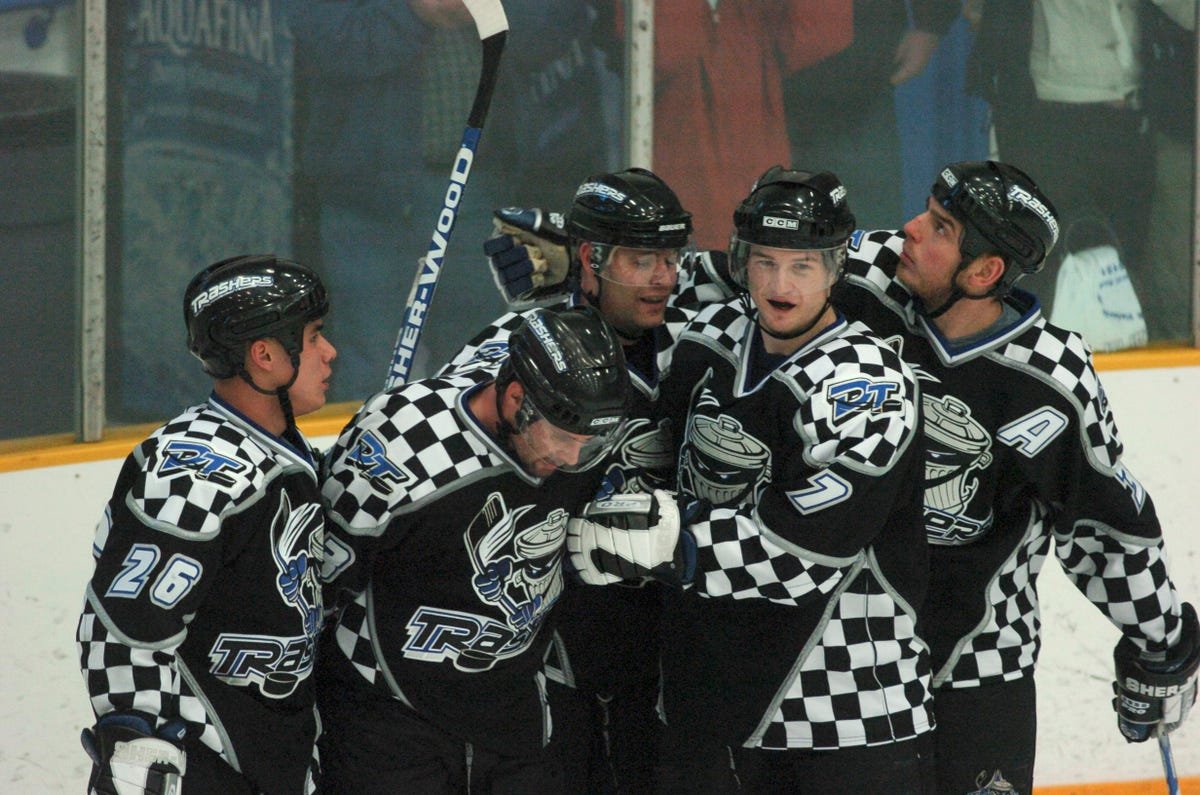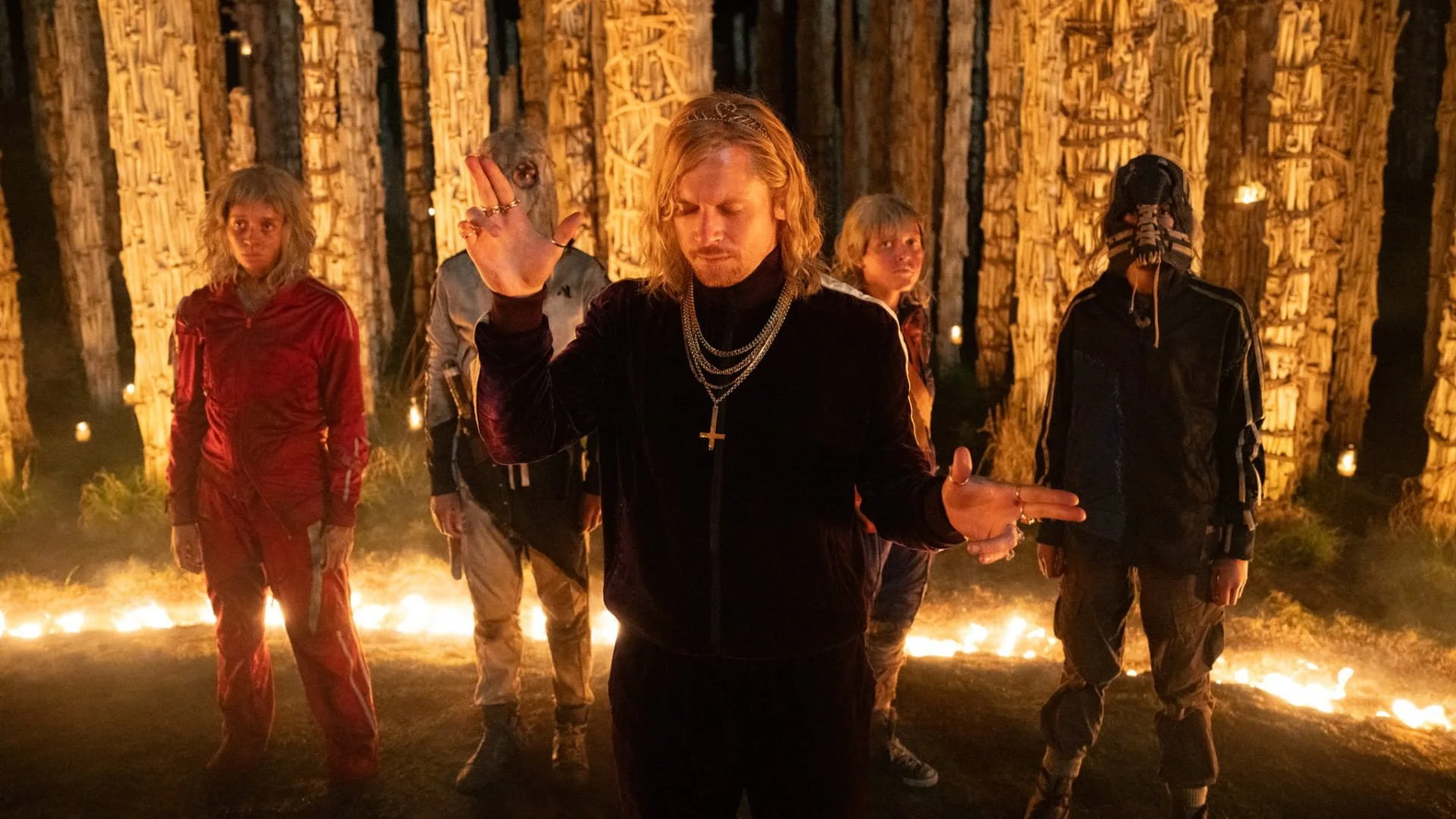Review: Untold: Crime & Penalties (2021)
Untold: Crime & Penalties is a tale of such absurdity and outlandishness in the world of sports, of course it has to be true. The latest film from documentarians Maclain and Chapman Way (Wild Wild Country), Crime & Penalties (the name presumably a reference to Dostoevsky’s Crime and Punishment) tells the story of the Danbury Trashers, a Connecticut hockey team in the United Hockey League that made waves during its short existence from 2004 to 2006. The film is a part of Netflix’s Untold series, which is their answer to the longform 30 for 30 documentaries of ESPN. The individual film provides a pulpit for a colourful cast of characters to reflect on the past and relive the glory of the team’s unlikely rise and quick fall. In this way, it plays much like a sequel to The Battered Bastards of Baseball, the Way Brothers’ previous film, which was also about a team of lovable rogues outpacing expectations in minor league sports.
In 2003, a Connecticut gangster named Jimmy Galante bought his 17-year-old son, A.J., a minor league hockey team and appointed him president and general manager. The 17-year-old filled the team with bruisers and tough guys, deliberately creating a bad boy image for the team and himself. The name he chose for the team summarized his approach and his dad’s control of the Connecticut waste disposal business: the Danbury Trashers. Improbably, the team was one of the best in the UHL and became something of a media sensation during the NHL lockout season of 2004-2005.
Over the course of Crime & Penalties, we meet the various rogues that fill out the Trashers’ front office and roster. There’s Jimmy Galante, team owner, who’s fresh out of prison and still running his waste disposal empire like a wannabe Tony Soprano. One of the interviewees even claims Tony Soprano was inspired by Jimmy, and Tony’s son A.J. happens to share a name with Jimmy’s. A.J. Galante is an awkward, sport-loving boy who grows up to be a blinged out goofball and who makes the team in the image of the bad boy he projects himself as. There’s the unhinged equipment manager, Tommy “T-Bone” Pomposello, a former peewee coach of A.J.’s who cackles with glee when recounting the insanity of the Trashers’ existence and who peppers his interviews with some memorable phrases, such as “Cocaine is a hell of a drug.” There are players such as Brad Wingfield, David Beauregard, Rumun Ndur, and Stanley Cup champion Michael Rupp, who join the team, enticed by the large sums of cash Jimmy promises them, as well as the underdog scrappiness of the team.
These various characters take us through the story of the Trashers, from the purchase of the team, to A.J. filling out of the roster, to the early days on the ice, and into success that takes the team into the playoffs. We get colourful anecdotes about Jimmy’s “bonuses” of $10,000 in cash after games given to players who get into fights, and we watch grainy news footage of key moments in the Trasher’s history. We watch fights, and fights, and more fights, as the Trashers run up the highest penalty minutes in league history.
An early moment in the film captures A.J.’s and the team’s flair for the dramatic. As A.J. explains, he knew he had to sign a big name off the top to set the tone and there was only one guy it could be: Gretzky. Not Wayne, of course, but rather, Wayne’s brother, Brent Gretzky, who signed as the Trasher’s first player. It’s absurd bait for the media, who gobble it up, hook, line, and sinker. The moment shows just what a showman and savvy media player A.J. was at 17.
Along the way, we also meet UHL commissioner Richard Brosal, who thought Jimmy’s purchase of the team and appointment of his son as president and GM was some sort of cruel joke. Richard acts as a foil to Jimmy and A.J. throughout—he’s homey and anything but flashy—but even he comes to respect the team and Jimmy and A.J.’s success. We also meet two FBI Agents who were investigating Jimmy at the time he owned the team.
The set-up—loveable gangsters and goofballs and enforcers on one hand, the lame commissioner and moralizing scold FBI agents on the other—is textbook underdog story, and the Way Brothers don’t do anything to waver from this conventional approach. The film is feel-good all the way up to the ending, when players tearfully embrace with an older Jimmy Galante, not caring one iota about his criminal status. There’s no moralizing or hand wringing over how Jimmy got his money, or any shocking criminal scandals that emerge during the team’s existence. Rather, everything is presented as goodnatured fun, about as stupid and entertaining and low stakes as a fight during a hockey game.
If this kind of hands-off, stick-to-the-game approach to the story sounds surface level or insufficient to you, you’re not entirely incorrect. The film never adequately digs into the complexities of Jimmy’s gangster life. But the thrill of the story of the Danbury Trashers is about what happened on the ice and in the locker room and offices of the Danbury Ice Arena, not about how Jimmy Galante got his millions or whether he’s a bad person. Half the fun of sports is witnessing an unlikely success story and seeing the camaraderie and teamwork that comes out of an absurd situation. The crime connections and teenage GM and drugs and unmarked bills are all flavour that add to the story of the team, but in the end, it’s what happened on the ice that makes it so remarkable. If the Trashers were bad, who’d have cared. It’s that they were good that makes the story worth telling.
7 out of 10
Untold: Crime & Penalties (2021, USA)
Directed by Maclain and Chapman Way.



This mockumentary starring Matt Johnson and Jay McCarrol is a complex metafiction farce and a loving portrait of friendship and Toronto.